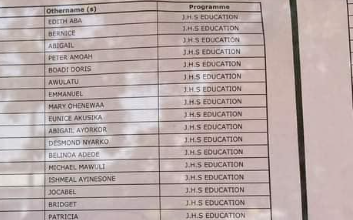Bad Labour Practice to Announce Updates of Negotiations: What has Changed
Table of Contents
ToggleBad Labour Practice to Announce Updates of Negotiations: What has Changed
In recent times, there has been a notable shift in the dynamics of labour negotiations, particularly within the realm of teacher unions in Ghana. As negotiations between teacher unions and the government unfold, a concerning trend has emerged – the reluctance of union leaders to disclose pertinent information to their members regarding the progress of these negotiations.
Under the Labour Act of Ghana, any act that seeks to threaten or intimidate the opposing party during negotiations of a collective agreement is deemed an unfair labour practice. In the case of the ongoing negotiations between teacher unions and the government, the reluctance to provide updates to members raises questions about transparency and the principles of fair negotiation.
The teacher unions embarked on negotiations with the government with the aim of revising certain allowances that are rightfully due to their members. Initially, promises were made to keep members informed of the progress, with assurances that all agreements would be finalized by the end of February. New GES Collective Agreement 2024
However, as time passed without any tangible updates, pressure from teachers mounted, compelling the unions to exert pressure on the government.
This pressure culminated in the threat of an industrial strike by the teacher unions, as they felt that their demands were not being adequately addressed. Despite some initial concessions from the government, the refusal of the unions to call off the strike led to intervention from the National Labour Commission, resulting in a court injunction to compel the unions to suspend their industrial action.
Following the resumption of negotiations after the strike, a concerning development emerged – the reluctance of union leaders to provide updates to their members. Members were informed that it was considered a bad labour practice to divulge information on ongoing negotiations before conclusions had been reached. This stance was in stark contrast to previous negotiations with other unions, where members were kept informed of developments throughout the negotiation process.
Instance
For instance, during negotiations with the University Teachers Association of Ghana (UTAG), members were regularly updated on progress, including significant milestones achieved in the negotiation process. This open communication fostered trust and transparency between union leaders and members, ensuring that members were well-informed and engaged throughout the process.
The same Union During the Base Pay Negotiation with Labour they, gave regular updates after each session of negotiations
The reluctance of teacher union leaders to adopt a similar approach raises concerns about transparency and accountability within the negotiation process. Members, who have a legitimate interest in the outcome of these negotiations, deserve to be kept informed of developments that directly impact their working conditions and welfare.
Furthermore, it is imperative to recognize that transparency and communication are fundamental principles of fair negotiation. In a democratic society governed by the rule of law, all parties involved in negotiations are entitled to access information and participate in decision-making processes that affect their interests.
In light of these developments, it is incumbent upon teacher union leaders to reconsider their approach to communication and transparency during negotiations. While detailed information may not always be feasible or appropriate to disclose, providing regular updates on the progress and status of negotiations is essential to upholding the principles of fairness and accountability.
As Ghanaian labour laws have evolved over the years to protect the rights of workers and promote fair labour practices, it is imperative that these principles are upheld in all aspects of labour relations, including collective bargaining. Members of teacher unions, like all workers, deserve to be treated with dignity and respect, and their right to information should be upheld throughout the negotiation process. Failure to do so not only undermines the principles of fair negotiation but also erodes trust and confidence in the leadership of teacher unions.
Teacher Unions Engage in Ongoing Negotiations with Government: Update April 8th






